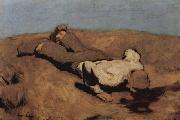Wholesale Oil Painting No Minimum |
|||||||||||
|
|
|||||||||||

|
|||||||||||
|
|
|
||||||||
Albin Egger LienzAlbin Egger-Lienz (29 January 1868 - 4 November 1926) was an Austrian painter. He was born in Dölsach-Stribach near Lienz, in what was the county of Tyrol. As an artist, he had a special preference for rustic genre and historical paintings; under the influence of Ferdinand Hodler, Egger-Lienz abstracted his formal language into monumental expressiveness. He trained first under his father (a church painter), later he studied at the Academy in Munich where he was influenced by Franz Defregger and French painter Jean-François Millet. In 1899 he moved to Vienna. During 1911 and 1912 he was professor at the Weimar School of Fine Arts and he served as war painter during World War I. In 1918, he turned down a professorship at the Vienna Academy and settled in South Tyrol. Egger-Lienz died on 4 November 1926 in St. Justina-Rentsch, Bolzano, Italy. |
||||||||
|
|
||||||||
Die Quelle
Die Quelle Painting ID:: 82789 |
1923(1923)
Medium Oil on canvas
Dimensions Deutsch: 85 x 126 cm
cyf 1923(1923) Medium Oil on canvas Dimensions Deutsch: 85 x 126 cm cyf |
|||||||
|
|
||||||||
|
Gustave Courbet 1819-1877 French Gustave Courbet Locations was a French painter whose powerful pictures of peasants and scenes of everyday life established him as the leading figure of the realist movement of the mid-19th century. Gustave Courbet was born at Ornans on June 10, 1819. He appears to have inherited his vigorous temperament from his father, a landowner and prominent personality in the Franche-Comte region. At the age of 18 Gustave went to the College Royal at Besancon. There he openly expressed his dissatisfaction with the traditional classical subjects he was obliged to study, going so far as to lead a revolt among the students. In 1838 he was enrolled as an externe and could simultaneously attend the classes of Charles Flajoulot, director of the ecole des Beaux-Arts. At the college in Besançon, Courbet became fast friends with Max Buchon, whose Essais Poetiques (1839) he illustrated with four lithographs. In 1840 Courbet went to Paris to study law, but he decided to become a painter and spent much time copying in the Louvre. In 1844 his Self-Portrait with Black Dog was exhibited at the Salon. The following year he submitted five pictures; only one, Le Guitarrero, was accepted. After a complete rejection in 1847, the Liberal Jury of 1848 accepted all 10 of his entries, and the critic Champfleury, who was to become Courbet first staunch apologist, highly praised the Walpurgis Night. Die Quelle 1864(1864) Medium oil on canvas Dimensions 62,5 X 81 cm cyf |
||||||||
|
|
||||||||
|
Prev Next
|
||||||||
|
|
||||||||
|
Related Paintings to Gustave Courbet :. |
||||||||
|
|
||||||||
|
CONTACT US |

